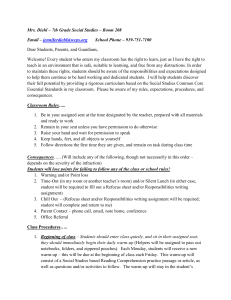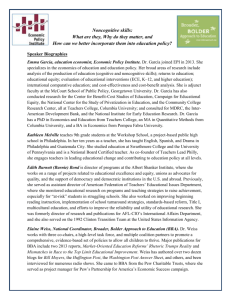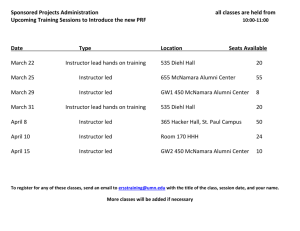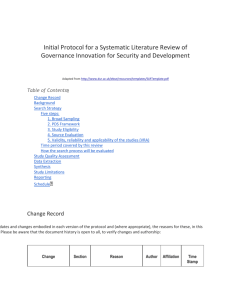INTERNATIONAL INSTITUTIONS
advertisement
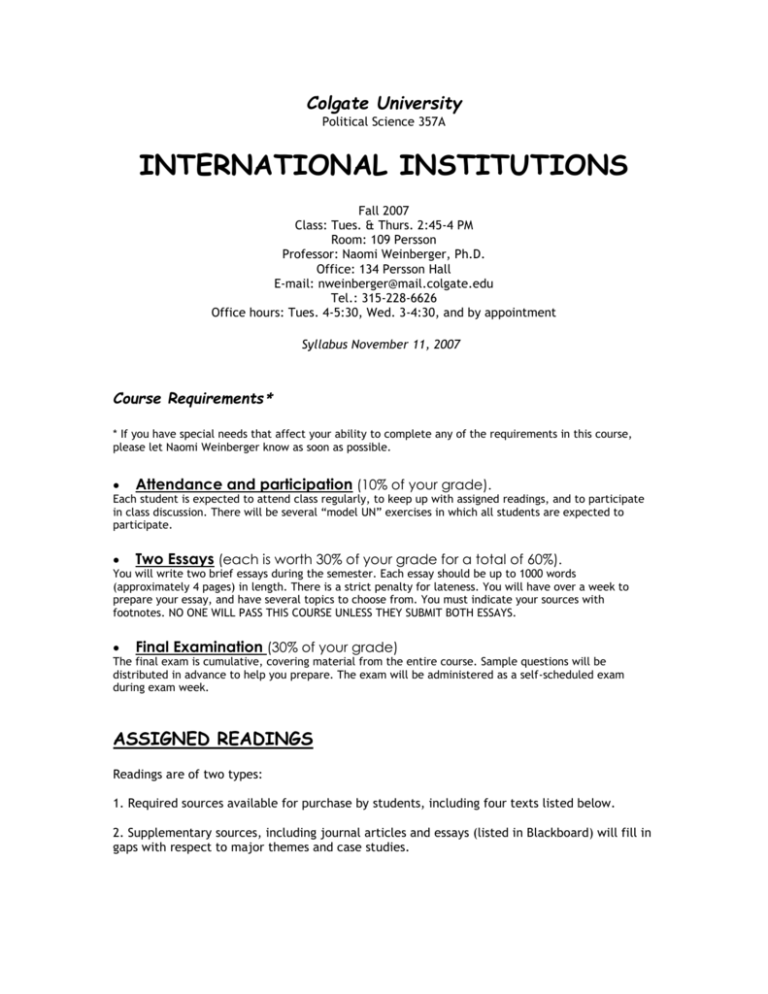
Colgate University Political Science 357A INTERNATIONAL INSTITUTIONS Fall 2007 Class: Tues. & Thurs. 2:45-4 PM Room: 109 Persson Professor: Naomi Weinberger, Ph.D. Office: 134 Persson Hall E-mail: nweinberger@mail.colgate.edu Tel.: 315-228-6626 Office hours: Tues. 4-5:30, Wed. 3-4:30, and by appointment Syllabus November 11, 2007 Course Requirements* * If you have special needs that affect your ability to complete any of the requirements in this course, please let Naomi Weinberger know as soon as possible. Attendance and participation (10% of your grade). Two Essays (each is worth 30% of your grade for a total of 60%). Final Examination (30% of your grade) Each student is expected to attend class regularly, to keep up with assigned readings, and to participate in class discussion. There will be several “model UN” exercises in which all students are expected to participate. You will write two brief essays during the semester. Each essay should be up to 1000 words (approximately 4 pages) in length. There is a strict penalty for lateness. You will have over a week to prepare your essay, and have several topics to choose from. You must indicate your sources with footnotes. NO ONE WILL PASS THIS COURSE UNLESS THEY SUBMIT BOTH ESSAYS. The final exam is cumulative, covering material from the entire course. Sample questions will be distributed in advance to help you prepare. The exam will be administered as a self-scheduled exam during exam week. ASSIGNED READINGS Readings are of two types: 1. Required sources available for purchase by students, including four texts listed below. 2. Supplementary sources, including journal articles and essays (listed in Blackboard) will fill in gaps with respect to major themes and case studies. BOOKS: Please purchase the following four texts, which are available at the Colgate Bookstore. The texts will also be placed on reserve at the University Library. 1. Paul Diehl, editor THE POLITICS OF GLOBAL GOVERNANCE: INTERNATIONAL ORGANIZATIONS IN AN INTERDEPENDENT WORLD 3rd ed.; Boulder: Lynne Rienner, 2005. 2. Thomas Weiss, David Forsythe and Roger Coate UNITED NATIONS AND CHANGING WORLD POLITICS 5th ed.; Boulder: Westview Press, 2007 3. Michael Barnett and Martha Finnemore RULES FOR THE WORLD: INTERNATIONAL ORGANIZATIONS IN GLOBAL POLITICS Cornell University Press, 2004 4. Edward C. Luck UNITED NATIONS SECURITY COUNCIL Routledge, 2006 TOPICS AND READINGS I. ISSUES AND ACTORS 1-2. Multilateralism & Global Governance (T 8/28 & R 8/30) Weiss, Introduction Barnett, Ch 1-2 Diehl, Ch 1: Pevehouse et al., “International Governmental Organizations.” Diehl, Ch 2: Abbott & Snidal, “Why States Act Through Formal International Organizations.” Diehl, Ch 3: Mearsheimer, “The False Promise of International Institutions.” 3. Lessons of the League of Nations (T 9/4) Luck Ch 1 Leland M. Goodrich, “From League of Nations to United Nations,” International Organization Vol. 1, No. 1 (Feb., 1947), pp. 3-21. Gerhart Niemeyer, “The Balance-Sheet of the League Experiment,” International Organization Vol. 6, No. 4 (Nov., 1952), pp. 537-558. Martin David Dubin, “Transgovernmental Processes in the League of Nations,” International Organization Vol. 37, No. 3 (Summer, 1983), pp. 469-493. 2 4. Centrality of the UN Security Council (R 9/6) Luck Ch 2-3 Diehl Ch 6: O’Neill, “Power and Satisfaction in the Security Council.” 5. UN Secretary-General and Principal Organs (T 9/11) Diehl Ch 5: Johnstone, “The Role of the Secretary-General.” Weiss, 241-285, 345-370. 6. Efforts at UN Reform (R 9/13--RESCHEDULE) Luck Ch 12, 13 Diehl Ch 7: Mendez, “Financing the United Nations.” 7. Regional Organizations (T 9/18) Diehl Ch 14: Mansfield and Milner, “The New Wave of Regionalism.” Shepard Forman and Andrew Grene, “Collaborating with Regional Organizations,” in David M. Malone, ed., The UN Security Council (Rienner, 2004), pp. 295-310. 8-9. Human Rights (R 9/20 &T 9/25) Weiss Ch 5, 6, 7 Diehl Ch 17: Dorsey, “The Global Women’s Movement.” ESSAY 1 II. GLOBAL SECURITY 10. Collective Security (R 9/27) Weiss Ch 1 Diehl Ch 8: Lynn Miller, “The Idea and Reality of Collective Security.” 11-12. Weapons of Mass Destruction (T 10/2 & R 10/4) Luck Ch 9 Stephen P. Rosen, “After Proliferation: What to Do If More States Go Nuclear,” Foreign Affairs (September/October 2006) Christopher Chyba, “Toward Biological Security,” Foreign Affairs (May/June 2003): 122-136. Michael J. Glennon, “Why the Security Council Failed,” Foreign Affairs (May/June 2003): 16-35. 3 13. Terrorism (T 10/9) Weiss Ch 4 Luck Ch 11 Bruce Riedel, “Al Qaeda Strikes Back,” Foreign Affairs (March/April 2007) Robert Rotberg, “Failed States in a World of Terror,” Foreign Affairs 81:4 (July/August 2002) Rosemary Foot, “Human Rights and Counterterrorism in Global Governance: Reputation and Resistance, Global Governance 11 (2005), 291-310. Alex J. Bellamy, “No Pain, No Gain? Torture and Ethics in the War on Terror,” International Affairs (Chatham House) 82:1 (January 2006): 121-148. 14. Traditional Peace Operations (R 10/11) Diehl Ch 10: Paul Diehl, “Forks in the Road: Theoretical and Policy Concerns for 21 st Century Peacekeeping.” Weiss Ch 2 Luck Ch 4 James Cockayne and David M. Malone, “The Ralph Bunche Centenial: Peace Operations Then and Now,” Global Governance, 11 (2005), pp. 331-350. III. CHALLENGES TO SOVEREIGNTY 15. Civil War (R 10/18) Diehl Ch 9: Robert Jackson, “International Engagement in War-Torn Countries.” Luck Ch 5, 6 16. Humanitarian Action (T 10/23) Weiss Ch 3 Barnett Ch 5 Diehl Ch 15: Andrew Natsios, “NGOs and the UN System in Complex Humanitarian Emergencies.” Samantha Power, "Bystanders to Genocide: Why the United States Let the Rwandan Tragedy Happen", The Atlantic Monthly (September 2001): 84-108. Lee Feinstein, “Darfur and Beyond: What is Needed to Prevent Mass Atrocities.” Council on Foreign Relations, CSR No. 22, Jan. 2007 [Available through JSTOR, about 40 pages, select sections?] “Darfur, the Security Council, and the International Criminal Court,” International and Comparative Law Quarterly, 55 (Jan. 2006), 226-236. 4 17. Peacebuilding (R 10/25) Luck Ch 7 Michael Sedra, “Security Sector Reform in Afghanistan: The Slide Towards Expediency,” 2006. International Peacekeeping 13:1 (March 2006): 94-110. 18. Transitional Justice (T 10/30) Luck Ch 8 Barnett Ch 4 Luc Cote, “Compliance with the Laws of War: The Role of the International Criminal Tribunal for Rwanda,” Chapter 6 in International Law and Organization. James Cockayne, “Hybrids or Mongrels? Internationalized War Crimes Trials as Unsuccessful Degradation Ceremonies,” Journal of Human Rights Volume 4 Number 4 (December 2005) John R. Bolton, “The Risks and Weaknesses of the International Criminal Court from America’s Perspective,” Virginia Journal of International Law 41:186: 188-203. ESSAY 2 IV. REDISTRIBUTING WEALTH 19. Globalization & Development (R 11/1) Weiss Ch 8 20. Money and Debt (T 11/6) Barnett Ch 3 Leslie Elliott Armijo, “The Political Geography of World Financial Reform,” in Diehl Ch 11. Diehl Ch 12: Eric Neumayer, “The Determinants of Aid Allocation by Regional Multilateral Development Banks,” Amy Verdun, “The role of the Delors Committee in the creation of EMU: an epistemic community?” Journal of European Public Policy, 6(2): 1999, pp. 308-28. 21. Trade (R 11/8) Diehl Ch 13: Keisuke Iida, “Is WTO Dispute Settlement Effective?” Kathleen McNamara, “The Institutional Dilemmas of Market Integration: Compliance and International Regimes for Trade and Finance,” Chapter 2 in International Law and Organization. - 5 22. Investment (T 11/13) Weiss pp. 277-8, 303-4 Jean-Philippe Therien and Vincent Pouliot, “The Global Compact: Shifting the Politics of International Development?” Global Governance 12 (2006): 55-75. V. PROSPECTS FOR THE PLANET 23-24.Climate Change(R 11/15) Peter Haas, “Banning Chlorofluorocarbons: Epistemic Community Efforts to Protect Stratospheric Ozone,” International Organization, 46(1): 1992, pp. 187-224. John Browne, “Beyond Kyoto,” Foreign Affairs (July/Aug 2004): Environmental Activism (T 11/20) Diehl Ch 16: Adil Najam, “The Case Against a New International Environmental Organization.” Michael Mason, “Citizenship Entitlements Beyond Borders? Identifying Mechanisms of Access and Redress for Affected Publics in International Environmental Law,” Global Governance 12 (2006), 283-303. 25. Health (T 11/27) Weiss pp. 298-303, 311-313 Laurie Garrett, “The Challenge of Global Health,’ Foreign Affairs (Jan/Feb 2007): Michael T. Osterholm, “Unprepared for a Pandemic,” Foreign Affairs (March/Apr 2007): Brian Salter, “The Global Politics of Human Embryonic Stem Cell Science,” Global Governance 13 (2007), 277-298. 26. Millenium Development Goals (R 11/29) Weiss Ch 9, 10 Special issue of the Journal of International Affairs (Columbia University) on the MDGs: Spring 2005 27. Review session for final exam (T 12/4) 6 7
